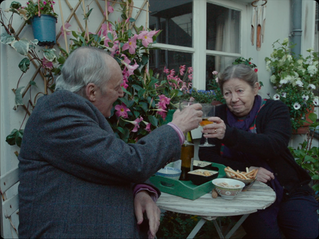Little Miss Sunshine
- Jodie Jeffs
- May 6, 2022
- 3 min read
Updated: May 7, 2022
Valerie Faris and Jonathan Dayton, 2006

The image of Miss America accepting her tiara reflects and refracts from the television screen onto the lens of a pair of oversized glasses on a completely captivated young girl. This is how we meet Olive, the youngest daughter of a dysfunctional family and an aspiring beauty pageant queen. From the opening shot, the film shows Olive’s dream through the distorted lens of her framed glasses and it becomes immediately apparent that her dream is nothing short of an optical illusion.
Little Miss Sunshine is both a classic American road movie and a bittersweet comedy about the journey towards finding authenticity and genuine truth in a world of manufactured success and false promises. Set in the American southwest, the film follows the Hoover family as they travel 700 miles from dusty Albuquerque to sunny California so that their daughter, Olive, can participate in the Little Miss Sunshine beauty pageant. Sheryl and Richard (Olive’s parents) pack Olive, Dwayne (Olive’s silent older brother), Uncle Frank (the heartbroken and depressed Proust scholar), and Grandpa (an abrasive drug addict and Olive’s dance coach) into an old mustard yellow VW minivan; a temperamental vehicle with a faulty car horn that can only get going with an assisted rolling start, and essentially another member of the dysfunctional family of eccentric so-called ‘losers’. Their journey takes them on the seemingly never-ending pursuit of the promise of Californian success, following the road so many have taken, only to reach their terminus and find themselves in a world of fake teeth, hair extensions, and damaging ideas. The film advocates the importance of non-conformity and authenticity over the superficial American values, which are so perfectly summarised through the grotesque world of beauty pageants. Directed by the husband-and-wife team of Jonathan Dayton and Valerie Faris and written by Michael Arndt, the film offers a remarkably unique take on the myth of the land of promise.
The road is, of course, not a simple journey; the Hoovers seem to encounter problem after problem in their personal lives, as a family, and with the vehicle itself. Olive is often oblivious to these difficulties deafened by her comically large headphones and with a head full of youthful optimism, blissfully unaware that she is the glue holding her family together. Confused about whether she can eat ice cream and still be as pretty as the beauty queens she idolizes and consumed with the overwhelming fear that she might be seen as a loser in the eyes of her father, she so desperately clings to the hope of standing on the stage herself and winning the title of Little Miss Sunshine. Yet, in a devastatingly tender moment the night before her big performance, she breaks down to her Grandpa and we finally see that Olive’s outward optimism and joy are all a performance. Questioning her worth against the traditional values of contemporary American society, she softly asks her Grandpa, behind a blubbering cascade of tears, whether she is ‘pretty’, and it is heartbreaking to see such a joyful, youthful child with a smile that has filled the frame begin to question whether she is good enough at all. Her Grandpa doesn’t hesitate in reassuring her that she is beautiful, without holding her to any standards of beauty or requirements of success. This moment wholly encapsulates the film’s message of the journey toward self-acceptance; something that Olive must come to discover on her own.
After a series of devasting losses and when the family should be at a breaking point, they become closer than ever when they see Olive on stage, finally competing for her dream only to find that she is horrendously out of place in the world of glamorous beauty pageants. Performing a mock striptease, choreographed by her Grandpa, to Rick James’ ‘Super Freak’ Olive is met with repulsion and disgust by the audience and the uptight judges. Yet her performance doesn’t seem any more grotesque than the appalling parade of young girls in swimming costumes, wigs, and makeup. In a glorious moment of solidarity, the entire Hoover family joins Olive on stage, after being ordered to get her off, to expose the double standards and hypocrisies of these beauty contests and embrace the joyful innocence of Olive’s dance routine, much to the seething disapproval of the judges.
Olive’s journey was never really in pursuit of a plastic crown or the audience’s applause. Rather, it was a desperate attempt to gain approval from her family for being herself, something she soon realises she never needed to pursue. Shunning a world of fake dreams and regressive ideals, Olive sets off back to Albuquerque and into the sunset with her family in their dusty old van and its noisy broken horn; without a crown, feeling like a winner.








Comments